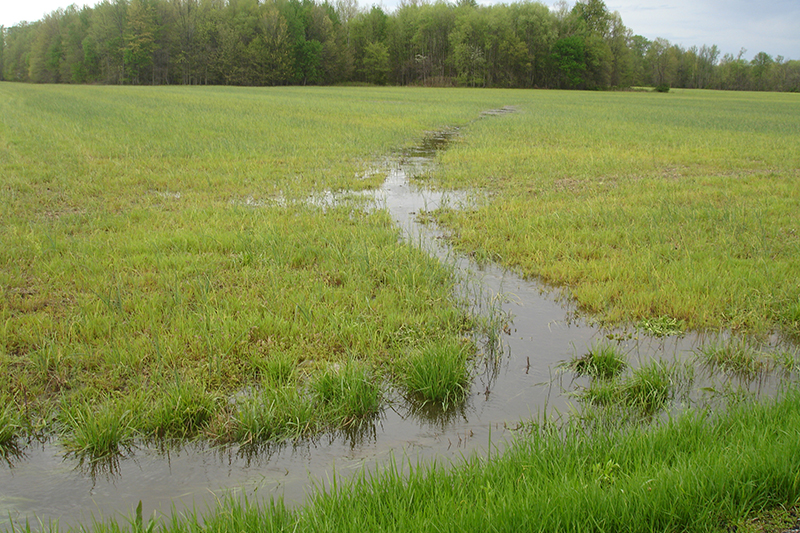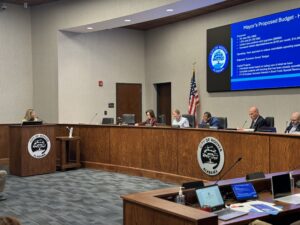Farmers are disappointed with Biden Administration revisions to water regulation rules

On Tuesday, the U.S. Environmental Protection Agency (EPA) and U.S. Army Corps of Engineers issued a final rule amending the 2023 definition of “waters of the United States.” According to original reporting by the Alabama Cattlemen’s Association, the amendments conform with the Supreme Court’s recent decision in Sackett v. EPA. The agencies had to amend their rule to conform to the U.S. Supreme Court decision while still following the law and implementing the Clean Water Act, which provides essential protections that safeguard the nation’s waters from pollution and degradation. The final action is intended to finally provide the clarity needed to advance these goals while moving forward with infrastructure projects, economic opportunities, and agricultural activities. Specifically, the amendments include: · Eliminates “interstate wetlands” from the list of jurisdictional waters. · Limits jurisdictional tributaries to features “that are relatively permanent, standing or continuously flowing bodies of water.” · Redefines “adjacent” as “having a continuous surface connection.” · The rule wholly removes the significant nexus test from consideration when identifying tributaries and other waters as federally protected. · It also revises the adjacency test when identifying federally jurisdictional wetlands. · It clarifies that interstate wetlands do not fall within the interstate waters category and clarifies the types of features that can be considered under the “additional waters” category. It is important to note that this amendment does not affect any other aspects of the 2023 rule, including agricultural exclusions. In the Sackett decision, the U.S. Supreme Court overturned a [Joe] Biden rewrite of the waters of the U.S. rule (WOTUS) that would have given the federal government strict oversight over every creek, tributary, pond, or drainage ditch in the country. The Alabama Farmers Federation is still opposed to the Biden Administration’s rewrite. The Alabama Farmers Federation’s Mitt Walker said the revisions, while technically in line with a May Supreme Court ruling, are discouraging. “It’s disappointing to see the EPA again hamper farmers’ rights to manage water on their land,” said Walker, who leads national affairs for Alabama’s largest general farm organization. “We have been fighting for clear, concise rules since the 2015 WOTUS rule was released. This is a small step in the right direction, but EPA must make more changes to roll back regulatory overreach.” EPA and the Army Corps of Engineers made the revisions without public notice and comments in response to the Sackett v. EPA Supreme Court ruling. The rule will take effect upon publication in the Federal Register. The Sackett case concerned two Idaho landowners, Michael and Chantell Sackett, who contended wetlands on their property were not “adjacent” under the Clean Water Act. Zippy Duvall is the President of the American Farm Bureau Federation. “EPA had a golden opportunity to write a Waters of the U.S. Rule that’s fair to farmers and stands the test of time but instead chose to continue government overreach and revise only a small slice of the rule that was rejected by the Supreme Court,” said Duvall, a farmer from Georgia. “We’re pleased the vague and confusing ‘significant nexus’ test has been eliminated as the Supreme Court dictated. But EPA has ignored other clear concerns raised by the justices, 26 states, and farmers across the country about the rule’s failure to respect private property rights and the Clean Water Act. Farmers and ranchers share the goal of protecting the resources they’re entrusted with. They deserve a rule that respects farmers as partners in that effort.” The current WOTUS dispute has now spanned three presidential administrations, beginning with President Barack Obama. This will potentially have had enormous economic impact for farmers, ranchers, developers, and even many residential communities. Anyone who interacts with water in the country. The Obama administration originally rewrote the existing rule, that applied to only navigable bodies of water. The Trump Administration overturned the Obama Administration rule change. Biden then reversed the Trump rule and reinstated the Obama rule. “The Biden Administration in two years has racked up more regulations than the Obama Administration did in eight years,” U.S. Senator Katie Britt (R-Alabama) said of the Biden rule earlier in the year before the Supreme Court ruling. “They’re continuing their red tape regime with yet another reckless rulemaking decision that would prioritize their leftwing political agenda at the expense of hardworking Americans. This type of job-killing overregulation would strangle Alabama farmers, cattlemen, manufacturers, energy producers, builders, landowners, and small businesses.” “Alabamians have tended to our own land, waterways, and resources for generations, and we remain best positioned to preserve and utilize them for generations to come,” Britt said. To connect with the author of this story or to comment, email brandonmreporter@gmail.com.
Katie Britt and Shelley Capito lead challenge to Joe Biden’s Waters of the U.S. rule

U.S. Senators Katie Britt and Tommy Tuberville joined Sen. Shelley Moore Capito and all of their Senate Republican colleagues introduced a formal challenge to the Biden Administration’s Waters of the United States (WOTUS) rule through a Congressional Review Act (CRA) joint resolution of disapproval. If both Houses of Congress pass a resolution rejecting a federal regulation under the CRA, that regulation is effectively nullified. This resolution comes after Joe Biden’s Environmental Protection Agency (EPA) and the U.S. Army Corps of Engineers announced a new rule in December 2022 repealing the Navigable Waters Protection Rule (NWPR), changing the definition of Waters of the United States in a way that will significantly expand federal regulatory authority over farmers, foresters, builders, developers, businesses, and even homeowners. “The Biden Administration in two years has racked up more regulations than the Obama Administration did in eight years,” Sen. Britt said. “They’re continuing their red tape regime with yet another reckless rulemaking decision that would prioritize their leftwing political agenda at the expense of hardworking Americans. This type of job-killing overregulation would strangle Alabama farmers, cattlemen, manufacturers, energy producers, builders, landowners, and small businesses.” “Alabamians have tended to our own land, waterways, and resources for generations, and we remain best positioned to preserve and utilize them for generations to come,” Britt said. Sen. Shelley Moore Capito is the Ranking Member of the Senate Environment and Public Works (EPW) Committee. “With its overreaching navigable waters rule, the Biden administration upended regulatory certainty and placed unnecessary burdens directly on millions of Americans,” stated Capito. “This Congressional Review Act resolution of disapproval will give every member of Congress the chance to stand with farmers, ranchers, landowners, and builders, and protect future transportation, infrastructure, and energy projects of all kinds in their states. I appreciate the widespread support we’ve received in both the Senate and House, and across the country, as we fight to place an important check on this misguided overreach from the Biden administration.” As Senator Capito introduced the CRA resolution in the Senate, U.S. Rep. Sam Graves, the Chairman of the House Committee on Transportation and Infrastructure (T&I), simultaneously introduced an identical resolution in the House. “As American families and businesses continue suffering under the economic crises caused by the disastrous Biden policies of the last two years, this Administration has inexplicably decided to move the country back toward the costly and burdensome WOTUS regulations of the past,” said Chairman Graves. “In an unnecessary drain on federal resources, the Administration clumsily put forward its rule before the Supreme Court has issued a ruling in the Sackett case, which will affect and alter what the Administration has put forward. Congress has the authority and responsibility to review onerous rules like this one handed down from the Executive Branch, and I hope our colleagues on both sides of the aisle will join in this effort to preserve regulatory clarity and prevent overzealous, unnecessary, and broadly defined federal power.” Numerous industry leaders and stakeholders have issued statements supporting the effort to overturn this rule. “As farmers, we want and need to protect the nation’s waters,” Alabama Farmers Federation President Jimmy Parnell said. “This rule muddies the water for property owners, will make conservation more difficult, and will create huge liabilities for farmers.” American Farm Bureau Federation (AFBF) President Zippy Duvall said, “Farmers and ranchers are committed to protecting the land and water they rely on to grow food for America’s families. Unfortunately, the back and forth over water regulations threatens the progress made to responsibly manage natural resources. We appreciate Congressmen Sam Graves, David Rouzer, and Senator Shelley Moore Capito for introducing a joint resolution to use the Congressional Review Act to stop the new Waters of the U.S. rule from going into effect. Farmers deserve rules that don’t require a team of attorneys and consultants to identify ‘navigable waters’ on their land.” The American Pipeline Contractors Association (APCA) said, “The American Pipeline Contractors Association is grateful for the introduction of this Congressional Review Act resolution and urges Congress to come together and swiftly overturn the new burdensome and unnecessary WOTUS regulations. There is widespread understanding in Washington that permitting reforms and regulatory overhaul are necessary to meet infrastructure goals and unlock the full potential of American energy, but this decision from the administration directly contradicts those goals. APCA urges the Biden administration to roll back this regulation as soon as possible and to instead work with Congress to undertake meaningful action toward reforming pipeline and general construction permitting processes.” American Road & Transportation Builders Association Vice President of Legal & Regulatory Issues Nick Goldstein said, “The recent Waters of the United States definition from the Environmental Protection Agency (EPA) would add more delay and confusion to the delivery of critical transportation improvements. By muddying federal Clean Water Act jurisdiction, EPA’s regulation directly contradicts the bipartisan infrastructure law’s goal of improving the project review and approval process. That’s why ARTBA supports House and Senate legislation to rescind the WOTUS rule.” Associated General Contractors of America (AGC) Vice President of Government Relations Jimmy Christianson said, “Senate Environment and Public Works Committee Ranking Member Shelley Moore Capito and House Transportation and Infrastructure Committee Chairman Sam Graves are right to express disapproval with the administration’s overreach and expansion of the waters of the United States regulatory program. AGC is disappointed that the agencies rushed through the sixth change in the requirements, in almost as many years, just as the U.S. Supreme Court is poised to decide on a related case. Employers try in good faith to keep pace with ever-shifting requirements that carry criminal as well as civil penalties for noncompliance.” Energy Marketers of America (EMA) President Rob Underwood said, “The Energy Marketers of America (EMA) recognize the enormous impacts the Biden Administration’s ‘Waters of the United States’ rule will place on small business energy marketers. In large part, WOTUS will determine whether costly land use restrictions will be imposed on new building or expansion projects, such as adding renewable liquid fuel pumps and/or electric charging stations. EMA supports the joint resolution of disapproval under the Congressional Review Act on the Biden Administration’s WOTUS rule.” Leading Builders of America CEO Ken Gear said,
Alabama Farmers Federation marking 100th anniversary

The Alabama Farmers Federation, a statewide force in agriculture, lobbying, and insurance, will mark its 100th anniversary at its two-day annual meeting, which begins Sunday. Almost 1,200 farmers from each of Alabama’s 67 counties are expected for the meeting, which will include the election of state leaders of the organization and a program honoring the group’s history. The program also will mark the 75th anniversary of the founding of Alfa Insurance Co., which was started by the organization in 1946. The company now provides coverage for more than 1 million farms, homes, cars, and businesses. “The centennial is a time to reflect on the past, remember those who came before us, and rejoice in our accomplishments,” Federation President Jimmy Parnell said in a statement. “It’s also a time for recommitment to our values and visions.” The president of the American Farm Bureau Federation, Zippy Duvall, is among the speakers at the gathering. Republished with the permission of the Associated Press.


